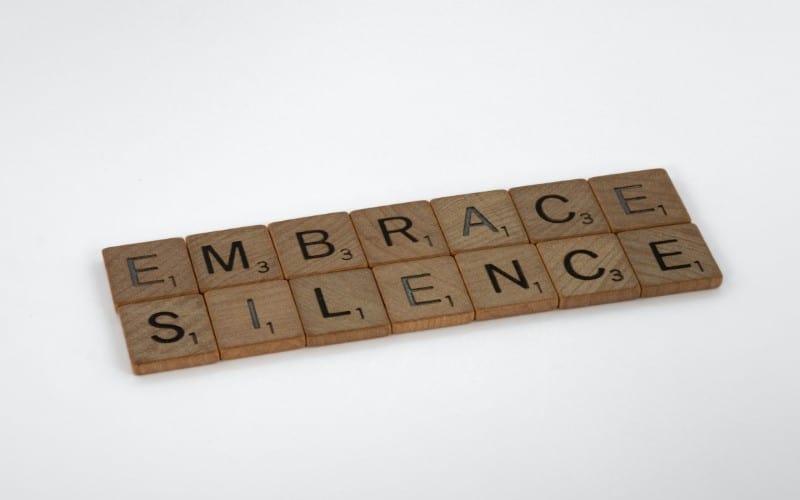Silence can be interpreted in many ways, depending on the context in which it is used. It can be a symbolism of a sign of fear, weakness, or strength. It can also be seen as a symbol of reflection or spiritual connection.
Silence is often seen as a negative thing, associated with loneliness, insecurity, and uneasiness. However, silence can also be a source of strength and power.
In many cultures, silence is seen as a sign of respect, and it is considered rude to interrupt someone who is speaking. Silence can also be seen as a way of showing reverence for something or someone.
For example, people often remain silent when they are in the presence of a religious figure or in a sacred place. In addition, silence can be used as a form of protest or resistance.

Quick Overview: Silence Symbolism
- Tension
- Awkwardness
- Secrets
- Shame
- Sadness
- Loneliness
- Anger
- Reflection
- Fear
9 Silence Symbolisms
1. Tension

In literature, silence often symbolizes tension. This is because silence can be seen as the absence of communication, which can lead to misunderstandings and conflict.
In addition, silence can also indicate a lack of understanding or agreement. For example, if two people are arguing and one of them suddenly falls silent, it may mean that they have reached an impasse.
Read More: Mind Symbolism
In this case, the silence itself becomes a form of tension. Likewise, if someone is being ignored or shunned, the resulting silence can be incredibly tense.
In conclusion, silence is often used to symbolize tension because it can create an atmosphere of unease and misunderstanding.
2. Awkwardness

Silence can be a symbol of awkwardness for a variety of reasons.
In social situations, it can be seen as a lack of interest or an inability to engage in conversation. It can also make people feel uncomfortable because it can be seen as a judgment of what is being said. In more personal interactions, silence can represent feelings of shame, insecurity, or even anger.
In these cases, the awkwardness comes from the fear of what might be revealed if we open up and speak our minds. However, there can also be positives to silence. In some cases, it can be used as a form of power or manipulation.
It can also be a way to take control of a situation or to avoid saying something that might hurt someone else’s feelings. Ultimately, the interpretation of silence is highly subjective and depends on the context in which it occurs.
3. Secrets

Secrets are often kept in silence because words have the power to make them real.
Once spoken, a secret can take on a life of its own, no longer contained within the confines of your mind. In addition, secrets can be burdensome, and speaking them aloud can relieve some of that burden.
Keeping secrets also requires self-control and discipline, both of which can be strengthened by silence. Lastly, silence allows us to keep our secrets to ourselves, rather than sharing them with others who may not be able to keep them safe.
In this way, silence can be seen as a form of protection for the secrets we hold dear.
4. Shame

There are many reasons why silence can symbolize shame.
In some cases, it may be because the person who is feeling shame is afraid to speak up or be seen. They may feel like they are not worth attention or that their voice will not be heard.
Silence can also be a way of trying to avoid conflict or unpleasant emotions. By staying silent, the person may hope to avoid any further embarrassment or hurt. In other cases, silence may be used as a form of control.
The person may feel like they are not worthy of speaking up and so they use silence as a way to keep others at bay. Whatever the reason, silence is often associated with shame because it is often seen as a way of hiding from the world.
5. Sadness

There are a few reasons why silence might symbolize sadness.
In some cases, it may be because sad people are often withdrawn and introspective, preferring to keep their thoughts to themselves. Silence can also be a way of grieving or processing pain, as people may find it difficult to speak about their sadness aloud.
In other cases, silence may be imposed from the outside, such as when someone is mourning the loss of a loved one or coping with a traumatic event. Whatever the cause, silence often amplifies feelings of sadness, making them all the more acute.
At the same time, there can also be a certain comfort in silence, as it can provide a space for reflection and introspection. In this way, silence can be both painful and healing, a reminder of our sorrows as well as a sign of hope.
6. Loneliness

In many ways, silence can be seen as the embodiment of loneliness.
It is often associated with feelings of isolation and despair, as well as a lack of companionship. For many people, silence is a reminder of their own solitude, and it can be difficult to find comfort in its presence.
Additionally, silence can be viewed as a sign of neglect or rejection, illustrating the emotional distance between people. In these ways, silence symbolizes the pain and isolation of loneliness.
However, it can also be seen as a healthy form of withdrawal, providing a much-needed respite from the chaos of the world. In either case, silence is often seen as a powerful symbol of our innermost emotions.
7. Anger

Anger is often described as a loud emotion, characterized by shouting and destructive behavior.
However, silence can also be a powerful expression of anger. When we are silent, we are withdrawing our energy and attention from the person or situation that has upset us.
This can be a very effective way of communicating our displeasure, especially when we feel that speaking would only make the situation worse. Silence can also be a sign of self-control, as we refrain from saying or doing something that we know would be harmful.
In this way, silence can actually be a very positive expression of Anger, showing that we are in control of our emotions and able to respond to them in a constructive way.
8. Reflection

Silence can be deafening. It can be a void that fills up space and time. In the emptiness, we are able to hear our thoughts and feelings more clearly. This is why silence symbolizes reflection.
When we are silent, we are able to take a step back from the noise and commotion of daily life and examine ourselves more closely. We can think about our actions and choices, and how they have led us to this point in our lives.
We can also reflect on our relationships with others, and how we can make them stronger. In short, silence allows us to connect with ourselves on a deeper level.
It is a time to recharge and refocus so that we can approach the world with fresh eyes.
9. Fear

Silence is often seen as a symbol of fear, mainly because it can be interpreted as a sign of weakness.
When we are afraid, we tend to freeze up and become lost for words. This can be interpreted as a lack of confidence, which can make others view us as being unable to handle the situation.
Silence can also be seen as a way of hiding our true feelings, as we may be afraid to speak up and express what we really think or feel. In many cases, silence is used as a form of self-protection, as we may feel that if we stay quiet, we will not be noticed or put in a position where we may be hurt.
However, silence can also be seen as a strength, as it can show that we are in control of our emotions and are not afraid to face the situation head-on.
Ultimately, the reason why silence symbolizes fear is that it is often seen as a sign of weakness or lack of confidence. However, it can also be viewed as a form of strength, depending on the context in which it is used.
Spiritual Meaning of Silence

For some people, silence is a way to connect with the divine. In many religions, prayer and meditation are done in silence.
This allows practitioners to focus on their connection to the divine without distractions. Silence can also be a way to show respect for religious figures or for sacred places.
For others, silence may be seen as a form of self-care. In our hectic lives, it can be difficult to find time to just be quiet and still.
However, making time for silence can help us to relax and recharge. It can be a way to connect with our own thoughts and feelings and to find peace in the midst of chaos.
Silence Dream Meaning and Symbolism

Dreams about silence usually symbolize some kind of problem or feeling of isolation.
The dream may be telling you that you need to address a particular issue in your life that is causing you stress or making you feel alone. Alternatively, the silence in your dream could represent your own feelings of insignificance or powerlessness.
If you feel like you are not being heard in your waking life, this could be reflected in a dream about silence. Alternatively, silence may also indicate that you are withholding your own voice, either out of fear or self-doubt.
The dream may be prompting you to speak up and express yourself more freely. Whatever the case may be, pay attention to the context of the dream and what else is happening in it to get a better understanding of its meaning for you.
Conclusion
Silence can symbolize a variety of things depending on the context in which it is used. It can be a sign of reflection, fear, or respect. It can also be a way to connect with the divine or to care for oneself. Silence is often seen as a sign of weakness, but it can also be interpreted as a sign of strength. Ultimately, the meaning of silence depends on the individual and the situation in which it is used.
